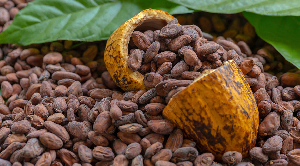This blog is managed by the content creator and not GhanaWeb, its affiliates, or employees. Advertising on this blog requires a minimum of GH₵50 a week. Contact the blog owner with any queries.
Ted News Ghana Blog of Tuesday, 8 April 2025
Source: TEDDY VAVA GAWUGA

Ghana’s export community is facing fresh uncertainty following the United States’ decision to slap a 10% import tariff on several goods—a move that could seriously impact the country’s non-traditional exports.
The new tariff, announced by US President Donald Trump, has sparked concern among local producers and exporters who fear losing ground in one of their most important markets. There’s growing anxiety about reduced revenues, shrinking market share, and the struggle to remain competitive in the face of rising costs.
According to the Ministry of Trade, Agribusiness and Industry, the sectors most affected include processed cocoa products, garments and textiles, cashew, shea butter, and a variety of fruits and vegetables—all major components of Ghana’s non-traditional export portfolio.
Ghana, known globally for its cocoa production, has been working to add value through increased exports of processed cocoa items. But officials worry the new US policy could undermine years of effort to diversify and grow this space.
Textiles and garments are also in the crosshairs. Despite gains made under the African Growth and Opportunity Act (AGOA), which offers duty-free access to the US market, the new import tax could erode Ghana’s cost advantage, making it tougher for local manufacturers to compete with cheaper suppliers elsewhere.
The agricultural sector isn’t spared either. Popular exports like cashew nuts, shea butter, yam, fruits, and vegetables are now subject to the tariff—raising fears that US buyers may back off or that exporters will be forced to bear the brunt of the added costs.
Trade experts warn that this development could pose a serious setback to Ghana’s export-led economic strategy, especially at a time when the country is trying to move away from raw material exports and build a stronger foreign exchange base.
However, not everyone sees doom and gloom. Some analysts believe this could be a turning point—an opportunity for Ghana to boost intra-African trade through the African Continental Free Trade Area (AfCFTA) and seek out new, untapped markets.
In a bid to address the issue, Ghana’s Ministers for Foreign Affairs and Trade, Agribusiness and Industry have engaged the US Ambassador to Ghana, Virginia Palmer, in diplomatic talks. The meeting, held behind closed doors on April 7, aimed to explore possible ways to ease the blow of the tariff and protect Ghanaian export interests.
